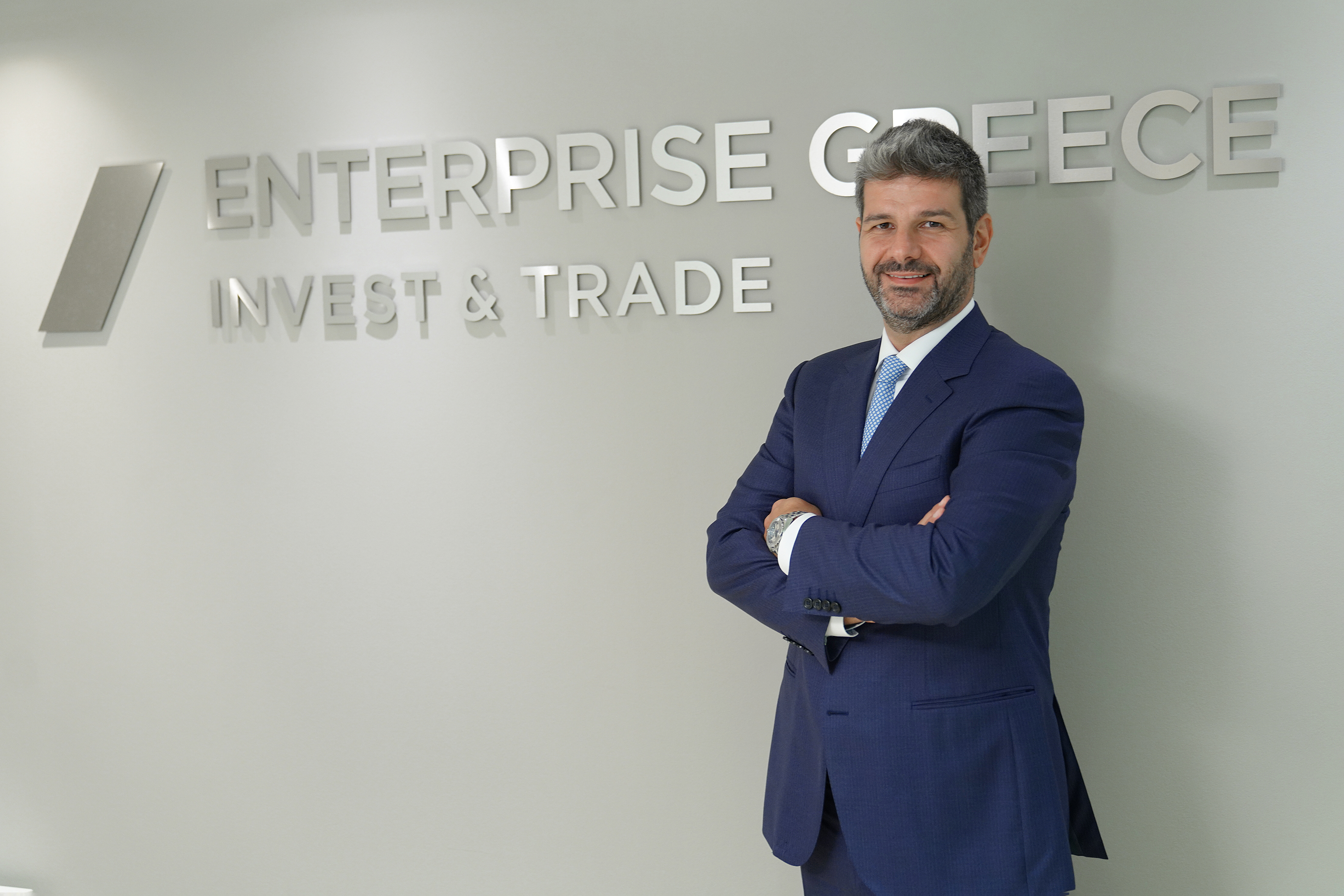
Greece’s surging economy is creating opportunities across a diverse range of sectors. Here, Enterprise Greece CEO Marinos Giannopoulos outlines his agency’s role in attracting international investment, forging partnerships with German business and the emerging sectors shaping Greece’s economic future.
Q: Which key decisions have shaped Enterprise Greece’s strategy?
Greece has become one of the fastest-growing economies in Europe. Comprehensive tax and regulatory reforms have reshaped the investment climate and substantially increased our attractiveness to foreign investors. We now benefit from a stable, pro-business government, and economic stability is essential for investors.
My role has been to shape and amplify this narrative. Each year, in collaboration with chambers of commerce, key stakeholders and other ministries, we develop a targeted action plan. For 2025 alone, we have designed over 650 initiatives — including trade fairs, business missions and promotional events — focusing on strategic markets. Our overarching goal is to raise exports to 60% of GDP by 2027 through focused, data-driven efforts.
The key decision has been to align our work fully with government policy, not only by promoting fiscal and regulatory improvements, but also by actively supporting investors in navigating Greece’s evolving landscape and translating strategy into tangible outcomes.
Q: What makes Greece an appealing destination for German companies?
Germany has become a key partner for Greece, now the second-largest source of foreign direct investment. What we are witnessing is not just a continuation of established business ties, but a diversification of German investments into high-value sectors such as R&D, life sciences, logistics and digital innovation. Notable examples include TeamViewer, which has established innovation hubs just outside Athens, as well as strategic investments by 2Way, Deutsche Telekom and others across multiple sectors.
These investments are a strong vote of confidence in the competitiveness of Greece’s employment environment. Greece offers a highly educated, multilingual and tech-savvy workforce — with strong academic foundations in engineering, computer science and life sciences. In parallel, the cost of doing business remains competitive compared to other EU locations, particularly in terms of labour and operational expenses.
Moreover, Greece offers a high quality of life, an attractive climate and a safe, family-friendly environment. Added to this are government-backed incentives for talent relocation, tax benefits for individuals and businesses establishing domicile in Greece and ongoing improvements in public infrastructure and digital governance.
Q: Which other key sectors do you see emerging based on current trends?
We actively promote a diverse range of high-potential sectors. Firstly, tourism remains a cornerstone of the Greek economy. We’re seeing continued growth in high-end tourism, wellness resorts and mixed-use developments. In renewable energy, meanwhile, Greece is rapidly transitioning towards a clean energy future. We are actively supporting investments in wind, solar, hydrogen and grid infrastructure. In ICT, we’re seeing a surge in activity around R&D, telecoms, cloud infrastructure and startups. Our national startup registry, Elevate Greece, now includes over 900 active and growing companies.
Greece’s strategic location, EU membership and favourable time zone, position it as a key hub for logistics and interconnectivity. Major port expansions, logistics parks and energy interconnection projects are underway. Additional focus sectors include audiovisual, which is booming, and defence and security – we see strong potential in advanced manufacturing, surveillance technologies and dual-use innovations.
Greece today is a modern, reform-driven economy, underpinned by strategic incentives and a skilled workforce. We are open for business — and shaping a future-ready investment landscape across diverse sectors.
Q: What scope is there for collaboration with German partners in biosciences?
Biosciences are a strategic priority for Greece, and we are placing strong emphasis on two key areas: biotechnology and pharmaceuticals. Greece is emerging as a regional innovation hub for Southeast Europe and the Eastern Mediterranean. Today, Greece is home to over 100 pharmaceutical manufacturing units and more than 40 research centres, many of which collaborate with global firms and academic institutions.
Germany is a vital partner in our broader strategy. We already maintain a presence at major German trade fairs and are exploring expanded cooperation in biotech and health innovation. We aim to facilitate B2B matchmaking, academic collaboration and investment opportunities between Greek firms and German stakeholders.
Q: What are the specific incentives Enterprise Greece is promoting to international investors?
We offer a comprehensive framework of targeted incentives — particularly for large-scale and strategic projects. These incentives fall into three main categories. The first is an expedited licensing process for investments designated as strategic. This process is coordinated across all relevant agencies and ministries and is typically completed within 45 days.
The second area is financial incentives, which vary depending on the size, nature and location of the investment. These may include tax reductions, cash grants, R&D subsidies or blended packages tailored to maximise investor support. And the third is regulatory incentives, which can include improved building coefficients, land-use adjustments and special planning provisions — especially for sectors like mixed-use development, tourism, logistics and renewable energy.
Q: How significant for business and investment is the Prime Minister’s meeting with the German Chancellor in May 2025?
The Prime Minister of Greece was honoured with the Gold Medal of the German Ludwig-Erhard Foundation — an award he humbly accepted. This recognition not only reflects Greece’s transformation but also underscores the shared progress of Europe and the evolving strategic partnership between Greece and Germany.
The focus of the bilateral relationship has expanded, moving beyond traditional areas like tourism to encompass investment, innovation and joint leadership within the European Union. In today’s increasingly complex global environment, a united, forward-looking Europe is more important than ever, and Greece is stepping into a more active role.

